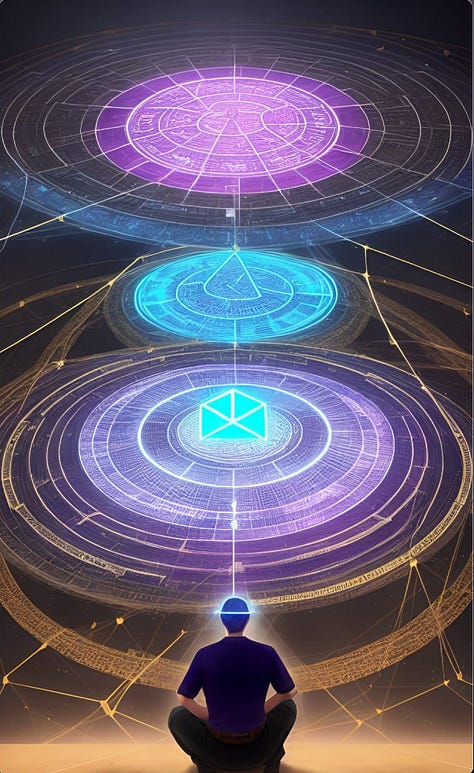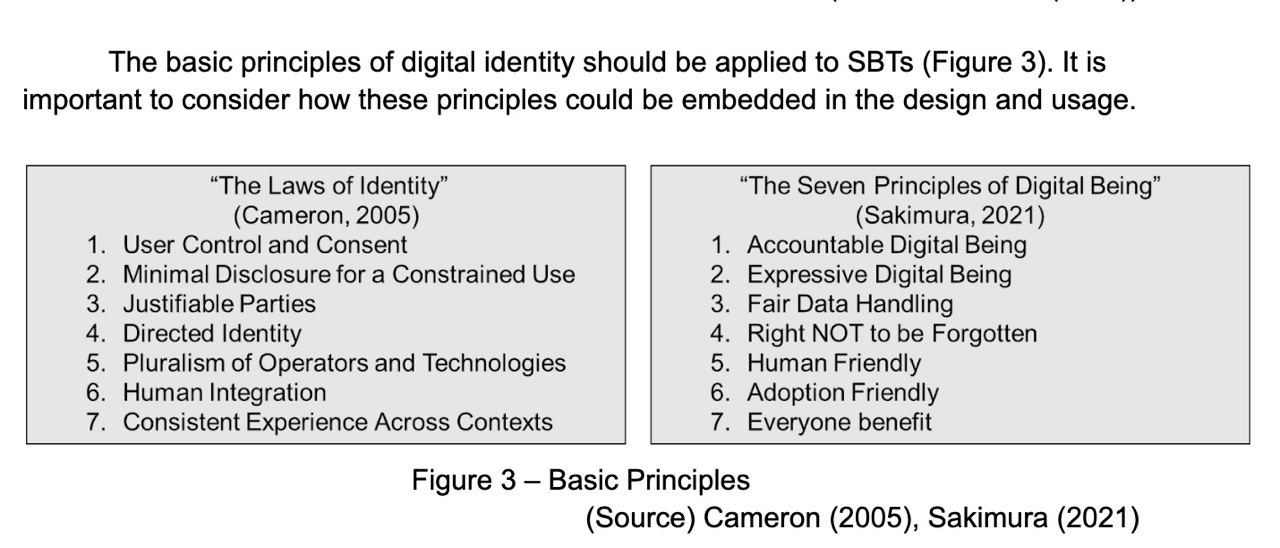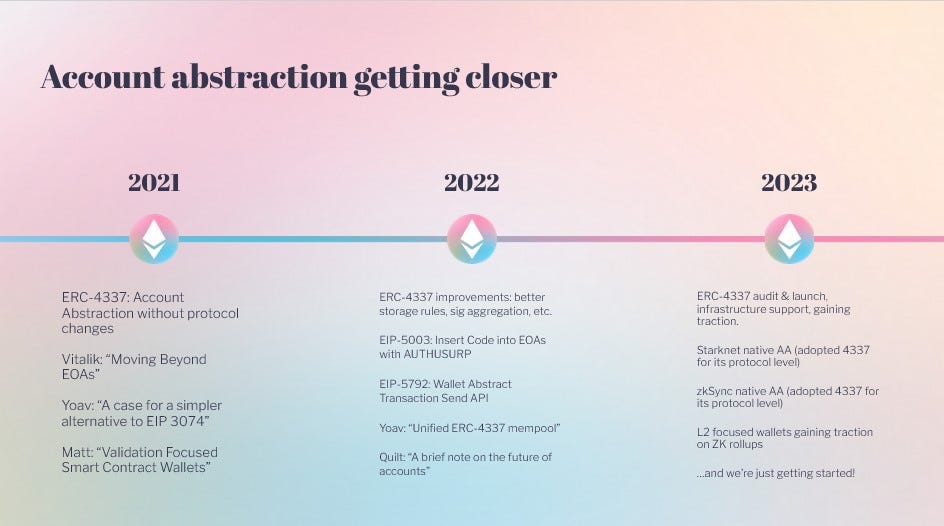Soul Sync #1
Community Update & Smart Souls (EIP4337)
SoulSync is the first community focused on exploring the implications of soulbound tokens and ‘soul’ related technology at the advent of a decentralised society.
Soul Sync,
Before I get into the first of our community updates, we’d like to say a massive thank you to everyone who has joined and engaged in the community with such enthusiasm and curiosity; it was only a week or so ago that we started SoulSync, and it’s been incredible to see this grow.
Let's dive right in with the updates and what’s been happening;
Highlights
At SoulSync, we establish high-trust social connections linking professionals, all attempting to solve big questions.
Sometimes all it takes is just knowing the right person and removing information asymmetry.
Here are our highlights;
The Right to be Deleted versus Right NOT to be forgotten.
Following on from this tweet1 by tahpot CEO of Verida, we discussed a few of the ways this problem can be solved or, ideally, provisioned for. This isn't the first time this has come up; it's a regular conversation among identity and privacy circles.
We shared fundamental principals of digital identity to be applied in the Soulbound Token Study Report2
Determining where the edges of what we put on-chain, as opposed to what should ideally be forgotten when working with immutable technology, is a very complex topic, yet critical to continue to discuss.
This conversation led to SBT lifecycle management, where Signata3 shared one approach to that problem—separating the management of an identity’s lifecycle versus that of an NFT/SBT. Could this be a more composable approach? Of course, it will have its trade-offs.
Thinking about the ‘Abundance Protocol’ whitepaper, talking public goods funding systems…
The community was fortunate to have the writer of the abundance whitepaper answer questions and explore ideas in SoulSync, the discussion was super interesting and relevant to many other projects in the community.4
“Yes, that's essentially what this protocol is trying to resolve - how to ensure that the economic value of public goods is accurately evaluated (and contributors are adequately compensated) and how everyone's interests in the ecosystem are aligned toward that goal.”
There are many potential interfaces where soulbound tokens could offer solutions to valuing the reputation associated with public goods funding and potentially leading to better incentives for broader contribution.
Smart Souls
EIP 4337 Account Abstraction
Over the past week, there has been a significant interest building around EIP43375, it has been the main take away from the energy at ETHDenver 2023, and rightly so. Account abstraction or “smart wallets” offers a solution to key management and the user experience problems associated with using cryptographic assets we have all had to live through, and learn to manage in either building or using blockchain technology.
Think of the new proposal as a progression for ‘gnosis-safe’ or ‘argent’ smart wallet technology, towards more decentralised outcomes.
I found this article from Cointelegraph on EIP43376 helpful in sharing an overview of how it all works and may fit into enabling a new wave of user adoption.
Many of the improvements are user experience related, which I believe is essential to adopting SBTs and decentralised technologies as a whole.
To summarise some of the surface-level uses;
Multicall:
Allowing for multiple transactions off-chain to be bundled in one atomic transaction called a multicall.
Session Keys:
Sessions can be defined in various ways, including a given duration, a maximum amount of gas, a maximum transaction volume, or a particular function. Allowing Dapps to abstract users away from the underlying technology requirements.
Social Recovery:
Mechanisms allow socially aligned users to recover wallets to the owner, enhancing the usability and security of accounts.
ERC4337 offers a few different pathways to social or communal recovery.
We explored the concept of recovery in the Soulbound Token study report (2) on p35; and are interested in continuing the discussion around how ERC4337 may dynamically evolve the possibilities for social and/or communal recovery.
A soul wallet design that satisfies the following three critical criteria is necessary:
Three Soul Wallet Design Objectives:
No single point of failure: there is no single thing (and ideally, no collection of things which travel together) which, if stolen, can give an attacker access to your funds, or, if lost, can deny you access to your funds.
Low mental overhead: as much as possible, it should not require users to learn strange new habits or exert mental effort to always remember to follow certain patterns of behavior.
Maximum ease of transacting: most normal activities should not require much more effort than they do in regular wallets (eg. Status, Metamask...)
In the most recent blog post from Vitalik on personal user experience7, Vitalik makes mention of ERC4337 and its potential to solve at least one aspect of social recovery issues outlined;
“Lesson learned: secret-sharing-based off-chain social recovery is just really fragile and a bad idea unless there are no other options. Your recovery guardians should not have to download a separate application, because if you have an application only for an exceptional situation like recovery, it's too easy to forget about it and lose it. Additionally, requiring separate centralized communication channels comes with all kinds of problems. Instead, the way to add guardians should be to provide their ETH address, and recovery should be done by smart contract, using ERC-4337 account abstraction wallets. This way, the guardians would only need to not lose their Ethereum wallets, which is something that they already care much more about not losing for other reasons.”
This is not the first time we’ve seen recovery8 come up.
Consider the difference between revocability and recoverability as fundamental to any SBT design. My question is, where does that sit, as a features within or separate standards?
A symbiosis between ERC4337 and SBTs makes a path toward decentralised society usable…
Announcements
SoulSync Community Podcast
One of the founding members, James, has offered to do an introduction chat with members.
Anyone who would like to say hello and introduce themself in a podcast ‘get to know’ the SoulSync community, reach out; we are thinking of fun ways of sharing this content in a community board-style fashion.
Research Paper
BGIN IKP working group has begun calling for public contributions to the Soulbound Token Research Paper Part 29
Our scope for Part 2 is as follows:
1. Reputational Value
2. Current State of the Soulbound Token Evolvement
2.1. Technological Development
2.2. Service Development (Use Cases)
Please reach out to the Soulbis team if you’d like to contribute. We can point you in the right direction!
Sync again soon…
Gallery of Souls
AI Art, community-driven prompts; Soul City, Soul Wallet
Contributions shared in the Gallery of Souls to be included week on week.










